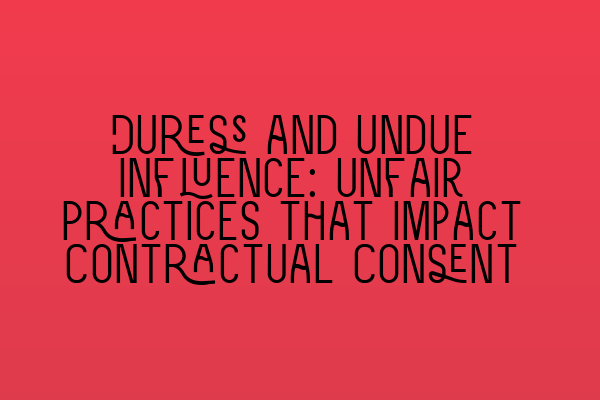Duress and Undue Influence: Unfair Practices that Impact Contractual Consent
Contracts are the foundation of business transactions and legal relationships. When entering into a contract, it is essential for both parties to give their consent freely and without any external influences that could undermine their decision-making process. However, there are situations where unfair practices may affect an individual’s ability to enter into a contract with genuine consent. Two such practices are duress and undue influence.
1. Duress
Duress occurs when one party exerts pressure or threats upon another party, forcing them to enter into a contract against their will. This can be done through physical, emotional, or economic coercion. For example, if a person is threatened with physical harm unless they sign a contract, their consent is not freely given and the contract can be considered voidable.
Duress can also take the form of economic pressure, such as when a party is induced to enter into a contract due to financial desperation or the fear of economic harm. In these cases, the contract may be deemed unconscionable if the terms greatly favor the party applying the pressure.
It is important to note that not all forms of pressure invalidate a contract under duress. For a contract to be considered voidable, the pressure applied must be significant enough to deprive the victim of their free will.
2. Undue Influence
Undue influence occurs when one party takes advantage of their position of power or trust to manipulate another party’s decision-making process. This often happens in situations where there is a relationship of trust, such as between family members, close friends, or professional advisors and their clients.
In cases of undue influence, the dominant party takes control over the weaker party’s will, manipulating them into agreeing to terms that they would not have otherwise accepted. The weaker party’s consent is thus undermined, and the contract may be considered voidable.
It is important to determine if the dominant party had a special relationship that gave them the opportunity to exercise influence, whether the weaker party was particularly vulnerable, and if the terms of the contract greatly favor the dominant party.
Implications of Duress and Undue Influence
Contracts entered into under duress or undue influence are considered voidable, meaning the affected party has the option to either affirm or rescind the contract. Affirming the contract means they choose to continue with the agreement despite the unfair practices, while rescinding the contract renders it null and void, relieving both parties of their obligations.
If the affected party decides to rescind the contract, they can seek legal remedies such as reimbursement for any losses suffered, restitution of property or money, and compensation for damages caused by the unfair practices.
It is crucial for individuals to be aware of their rights when it comes to entering into contracts and to seek legal advice if they suspect that duress or undue influence played a role in their agreement.
Conclusion
Duress and undue influence are unfair practices that impact contractual consent. It is vital for individuals to recognize the signs of these practices and take appropriate action to protect their rights and interests. Understanding the implications of duress and undue influence can help individuals make informed decisions and ensure fair contractual relationships.
For more information on legal topics and career guidance, check out the following related articles:
- Mentorship for Aspiring Solicitors: Nurturing Talent in the Legal Field
- Legal Challenges and Pitfalls: Navigating the Complexities of the Legal System
- The GDL (Graduate Diploma in Law): A Pathway to Becoming a Solicitor
- Mastering the Solicitor’s Path: Prepare for the Journey Ahead
- The Benefits of Becoming a Solicitor: A Rewarding Career
